英国文学课件 Dover Beach
- 格式:ppt
- 大小:1.21 MB
- 文档页数:6

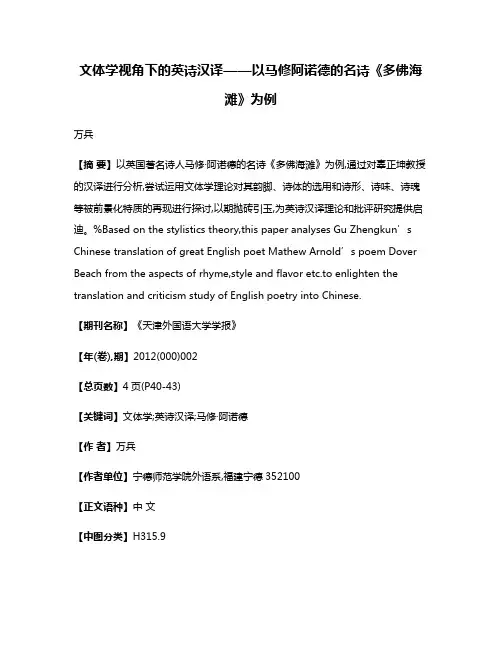
文体学视角下的英诗汉译——以马修阿诺德的名诗《多佛海滩》为例万兵【摘要】以英国著名诗人马修·阿诺德的名诗《多佛海滩》为例,通过对辜正坤教授的汉译进行分析,尝试运用文体学理论对其韵脚、诗体的选用和诗形、诗味、诗魂等被前景化特质的再现进行探讨,以期抛砖引玉,为英诗汉译理论和批评研究提供启迪。
%Based on the stylistics theory,this paper analyses Gu Zhengkun’s Chinese translation of great English poet Mathew Arnold’s poem Dover Beach from the aspects of rhyme,style and flavor etc.to enlighten the translation and criticism study of English poetry into Chinese.【期刊名称】《天津外国语大学学报》【年(卷),期】2012(000)002【总页数】4页(P40-43)【关键词】文体学;英诗汉译;马修·阿诺德【作者】万兵【作者单位】宁德师范学院外语系,福建宁德352100【正文语种】中文【中图分类】H315.9一、引言文体学是一门介于语言学、文艺学、美学、心理学等之间的综合性边缘学科。
这一理论的运用对英诗汉译及批评研究等问题有极强的解释力,而此方面的研究文章尚不多见。
本文以英国著名诗人马修· 阿诺德的名诗《多佛海滩》为例,通过分析辜正坤教授的汉译,对其韵脚、诗体的选用和诗形、诗味、诗魂等被前景化特质的再现进行探讨,旨在为英诗汉译理论和批评研究提供启迪。
二、原诗前景化特质的再现诗人从英吉利海峡遥望法兰西灯火明灭,英伦峭壁森森,月洗平沙,潮卷砾石,更有怒掷高滩之海浪。
两节诗写景动人,映衬诗人满腹悲愁,意境悲壮。
译者极力琢磨,充分兼顾中国读者的接受心理和阅读情趣,良苦用心足见一斑。
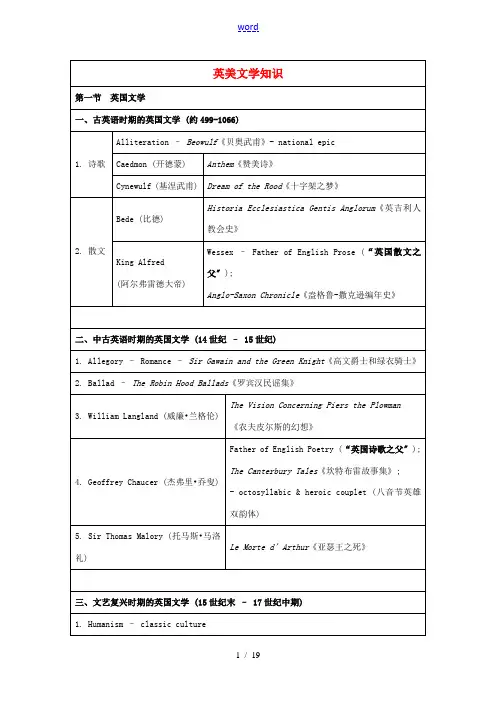
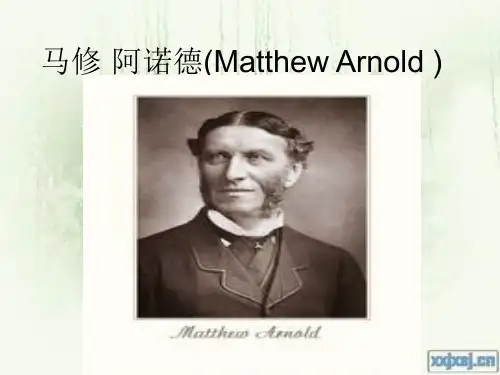
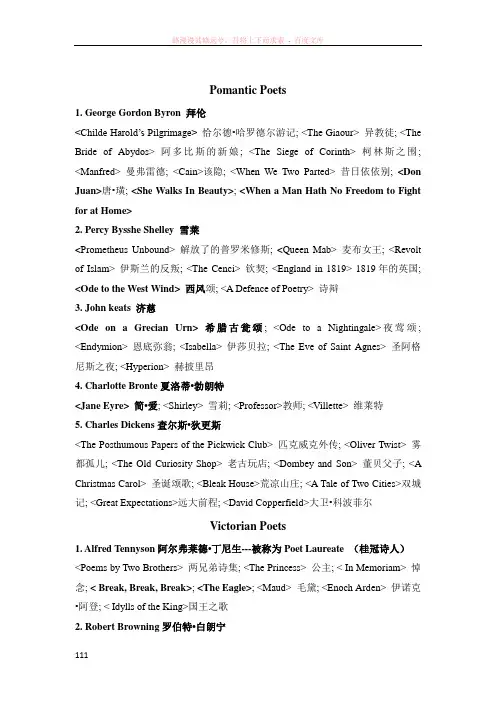
Pomantic Poets1. George Gordon Byron 拜伦<Childe Harold’s Pilgrimage> 恰尔德•哈罗德尔游记; <The Giaour> 异教徒; <The Bride of Abydos> 阿多比斯的新娘; <The Siege of Corinth> 柯林斯之围; <Manfred> 曼弗雷德; <Cain>该隐; <When We Two Parted> 昔日依依别; <Don Juan>唐•璜; <She Walks In Beauty>; <When a Man Hath No Freedom to Fight for at Home>2. Percy Bysshe Shelley 雪莱<Prometheus Unbound> 解放了的普罗米修斯; <Queen Mab> 麦布女王; <Revolt of Islam> 伊斯兰的反叛; <The Cenci> 钦契; <England in 1819> 1819年的英国; <Ode to the West Wind> 西风颂; <A Defence of Poetry> 诗辩3. John keats 济慈<Ode on a Grecian Urn> 希腊古瓮颂; <Ode to a Nightingale>夜莺颂; <Endymion> 恩底弥翁; <Isabella> 伊莎贝拉; <The Eve of Saint Agnes> 圣阿格尼斯之夜; <Hyperion> 赫披里昂4. Charlotte Bronte夏洛蒂•勃朗特<Jane Eyre> 简•爱; <Shirley> 雪莉; <Professor>教师; <Villette> 维莱特5. Charles Dickens查尔斯•狄更斯<The Posthumous Papers of the Pickwick Club> 匹克威克外传; <Oliver Twist> 雾都孤儿; <The Old Curiosity Shop> 老古玩店; <Dombey and Son> 董贝父子; <A Christmas Carol> 圣诞颂歌; <Bleak House>荒凉山庄; <A Tale of Two Cities>双城记; <Great Expectations>远大前程; <David Copperfield>大卫•科波菲尔Victorian Poets1. Alfred Tennyson阿尔弗莱德•丁尼生---被称为Poet Laureate (桂冠诗人)<Poems by Two Brothers> 两兄弟诗集; <The Princess> 公主; < In Memoriam> 悼念; < Break, Break, Break>; <The Eagle>; <Maud> 毛黛; <Enoch Arden> 伊诺克•阿登; < Idylls of the King>国王之歌2. Robert Browning罗伯特•白朗宁< My Last Dutchess> 我已故的公爵夫人; <Paracelsus> 巴拉塞尔士; <Strafford> 斯特拉福; <Pippa Passes> 皮帕走过了; <Dramatic Lyrics> 戏剧抒情诗; < Dramatic Romance and Lyrics> 戏剧传奇及抒情诗; <Men and Women> 男男女女; <Dramatic Personae> 剧中人物; <The Ring and the Book> 指环与书3. Matthew Arnold 马修•阿诺德<The Strayed Reveller> 迷途浪子; <Poems> 诗集; <Poems: Second Series> 诗歌二集; <New Poems> 新诗集; <Essays in Criticism> 评诗集; <Culture and Anarchy> 文化与无政府; <Literature and Dogma> 文学与教条; <Dover Beach> 多福海滩4. Thomas Hardy托马斯•哈代---(小说多以农村生活为背景;自然主义小说家。
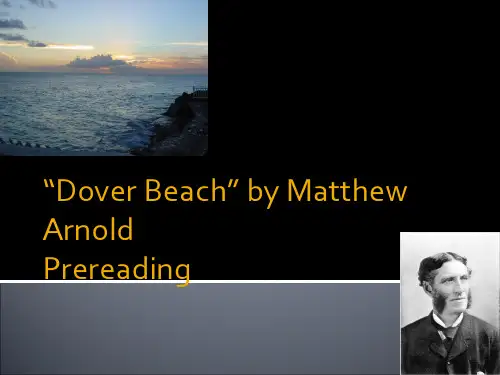
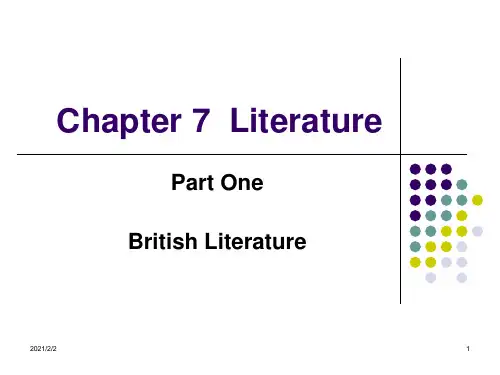
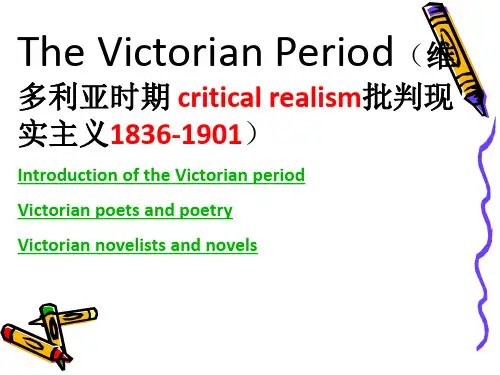
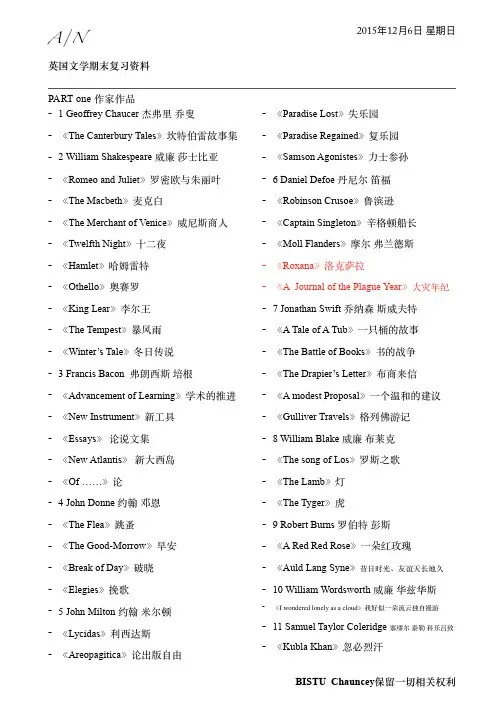
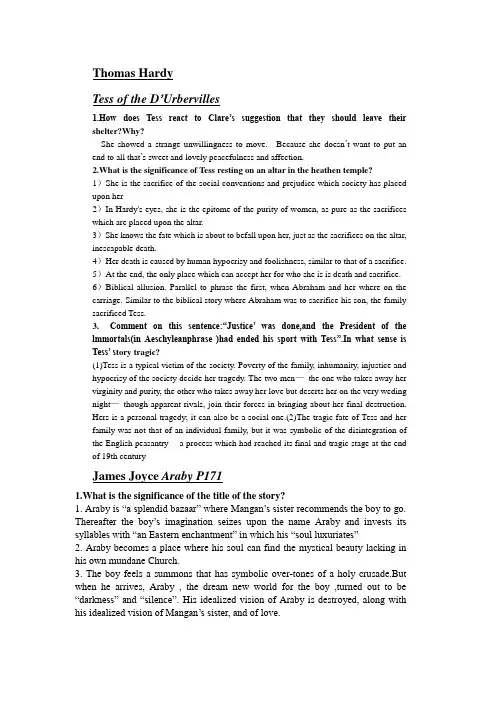
Thomas HardyTess of the D’Urbervilles1.How does Tess react to Clare’s suggestion that they should leave theirshelter?Why?She showed a strange unwillingness to move. Because she doesn’t want to put an end to all that’s sweet and lovely peacefulness and affection.2.What is the significance of Tess resting on an altar in the heathen temple?1)She is the sacrifice of the social conventions and prejudice which society has placed upon her2)In Hardy's eyes, she is the epitome of the purity of women, as pure as the sacrifices which are placed upon the altar.3)She knows the fate which is about to befall upon her, just as the sacrifices on the altar, inescapable death.4)Her death is caused by human hypocrisy and foolishness, similar to that of a sacrifice.5)At the end, the only place which can accept her for who she is is death and sacrifice.6)Biblical allusion. Parallel to phrase the first, when Abraham and her where on the carriage. Similar to the biblical story where Abraham was to sacrifice his son, the family sacrificed Tess.3. Comment on this sentence:“Justice’ was done,and the President of thelmmortals(in Aeschyleanphrase )had ended his sport with Tess”.In what sense is Tess’ s tory tragic?(1)Tess is a typical victim of the society. Poverty of the family, inhumanity, injustice andhypocrisy of the society decide her tragedy. The two men—the one who takes away her virginity and purity, the other who takes away her love but deserts her on the very weding night—though apparent rivals, join their forces in bringing about her final destruction.Hers is a personal tragedy; it can also be a social one.(2)The tragic fate of Tess and her family was not that of an individual family, but it was symbolic of the disintegration of the English peasantry--- a process which had reached its final and tragic stage at the end of 19th centuryJames Joyce Araby P1711.What is the significance of the title of the story?1. Araby is “a splendid bazaar” where Mangan’s sister recommends the boy to go. Thereafter the boy’s imagination seizes upon the name Araby and invests its syllables with “an Eastern enchantment” in which his “soul luxuriates”2. Araby becomes a place where his soul can find the mystical beauty lacking in his own mundane Church.3. The boy feels a summons that has symbolic over-tones of a holy crusade.But when he arrives, Araby , the dream new world for the boy ,turned out to be “darkness” and “silence”. His idealized vision of Araby is destroyed, along with his idealized vision of Mangan’s sister, and of love.2.Chief qualities of the boy’s character?The boy is a natural character with which to begin a book because he possesses so many qualities attractive to readers. First, he is sensitive — sensitive enough to experience a wide range of feelings in spite of his tender age, including apparently contradictory combinations like fear and longing (at the end of the story's first paragraph), anger and puzzlement (while falling asleep), and, especially, "a sensation of freedom" in response to his mentor's passing that surprises him and us. "I found it strange," the narrator says, "that neither I nor the day seemed in a mourning mood."Second, he is intelligent — and not merely in the conventional sense of the word. Sure, he is brainy enough to absorb much of the arcane information shared with him by the priest. (It makes sense that he has grown into the articulate storyteller who shares the tale of Father Flynn's influence upon him.) But the protagonist of "The Sisters" also possesses an intuitive understanding of how other human beings feel, think, and act —emotional intelligence, you might call it.It is no surprise that a boy so sensitive, so intelligent, would find himself somewhat alienated from others — cut off, fundamentally, from his family and peers. He appears to lack altogether a connection with his uncle, much less Old Cotter, and it is said that he rarely plays "with young lads of his own age." Even when he is in the company of his aunt and the priest's sisters near story's end, the reader's main sense of the boy is that he is alone.The school boy, in the story 'Araby", is the narrator of the story. He has not yet attained majority and is by nature bashful. He lived alone with his auntie and uncle and knew a few play-mates with whom he played in the street. Mangan's sister was perhaps only girl who lived in his neighborhood. He started appreciating her figure and dress without actually realizing that he had grown to like her. Being preadolescent person he had not become conscious that such a passion is just natural and it does not call for apology or regrets.If he had expressed his noble feeling of love for the girl he might have been able to overcome his bashfulness. Once he hesitated in expressing his sentiments, he developed an inhibition with the result that he was never able to make his feelings known to her. He went worshipping her silently. By chance, she happened to talk to him, he felt confused and did not know how to express himself. His desire to visit Araby became an obsession for him and he made up his mind to go to the market at the earliest and bring a gift for her. The hour that he reached Araby, was not at all fit for purchasing something really worthwhile. He experienced a sort of bitterness even worse than defeat. Being a lonely person, he is in search of a kindred soul. But lacking self-confidence he is not able to win her, as any other person without inhibition could have done so easily.The boy in the story is so bashful and inept in his relation with Mangan's sister only. He was quite a sociable boy in his own way and was good at studies. His auntie and uncle never discovered any oddity about him. He certainly proved quite helpful when he accompanied his aunt on her shopping trips. After his missed venture with Araby he lost interest in his studies. His teacher stared feeling concerned about him. But he did not know the real reason for this lack of interest in his studies. He is a hardworking and responsible boy and is capable of changing his attitude in keeping with the changingconditions. His unrequited love has proved disappointing experience for him, but certainly it would have made him wiser and more practical in future.3.Is anything gained by the boy through his frustration and humiliation?The boy is initiated into knowledge through a loss of innocenceThe boy worships and desires Mangan’ssister , and Mangan’s sister is the light that contracts to the gloomy reality.But the quest ends when he arrives at the bazaar and realizes with slow, tortured clarity that Araby is not at all what he has imagined. He feels angry and betrayed and realizes his self-deception.The boy is initiated into knowledge through a loss of innocence and fully realizes the incompatibility between the beautiful and innocent world of the imagination and the very real world of fact. So the “quest” is not fruitless, becaus e it helps the narrator come to self-knowledge.D.H. LawrenceThe rocking-horse winnerDoes the house really whisper?No, it is not the house whispers.The expensive and splendid toys, the shining modern rocking horse and the smart doll’s house are the reflection of the parents’ vanity. This couple bought so many expensive things means that they want to have a life of nabobism and a nabobism life means that there must be more money.This phrase was used intentionally to emphasize the theme“greed”Does luck mean money? How do you define luck?No….Who kills Paul?It was the society killed Paul.The development of urban industrialism caused people only care money. At that time,people thought money is everything. So,in the novel, the house whispered and mom emphasized luck so many times. Paul wanted to get his mother’s attention by money which forced him to ride the rocking-horse again and again. Paul was ill and the whole society was ill too.Matthew Arnold Dover BeachForm•Preserves the structure of the Romantic Lyric (Descriptive-Meditative-Descriptive)•“Dover Beach” is a poem with the mournful tone of an elegy and the personal intensity ofa dramatic monologue. Because the meter and rhyme vary from line to line, the poem issaid to be in free verse—that is, it is unencumbered by the strictures of traditional versification. However, there is cadence in the poem, achieved through the following: •Parallel Structure•The tide is full, the moon lies fair (Stanza 1); So various, so beautiful, so new (Stanza 4);•Hath really neither joy, nor love, nor light / Nor certitude, nor peace, nor help for pain (Stanza 4)•Rhyming Words•to-night, light; fair, night-air; stand, land; bay, spray; fling, bring; begin, in (Stanza 1) •Words Suggesting Rhythm•draw back, return; Begin, and cease, then begin again (Stanza 1); turbid ebb and flow (Stanza 2)Figures of Speech•Alliteration:•to-night , tide; full, fair (Lines 1-2); gleams, gone; coast, cliff; long line; which the waves;folds, furled; to-night, tide; full, fair; gleams, gone; coast, cliff (Stanza 1) •Assonance: t ide, l ies;•Paradox and Hyperbole: grating roar of pebbles•Metaphor:•which the waves draw back, and fling (comparison of the waves to an intelligent entity that rejects that which it has captured)•turbid ebb and flow of human misery (comparison of human misery to the ebb and flow of the sea)•The Sea of Faith (comparison of faith to water making up an ocean)breath of the night-wind (comparison of the wind to a living thing)•Simile:•The Sea of Faith . . . lay like the folds of a bright girdle furled (use of like to compare the sea to a girdle)•the world, which seems / To lie before us like a land of dreams (use of like to compare the world to a land of dreams)•Anaphora:•So various, so beautiful, so new (repetition of so)nor love, nor light, / Nor certitude, nor peace, nor help for pain (repetition of nor) ThemeArnold’s central message is this: Challenges to the validity of long-standing theological and moral precepts have shaken the faith of people in God and religion•Decay of orthodox religious beliefs•“Let us be true to one another”: Emphasizes personal connection•Subverts Romantic View of Nature•The underlying theme of the poem is the hollowness of human lives, how everything looks beautiful at face value but is far from it in reality•The superficial calm prevailing in the world is brought out.1.Humanity-----the sea2.Sea-----humanity’s religious faith(ebbing tide is to nature----- loss of faith is to humanity)3.Sea-----land of dreams。

BOOK 11、Geoffrey Chaucer (1340-1400) 杰弗里•乔叟The Canterbury Tales《坎特伯雷故事》2、Sir Thomas Malory (1405?-1471) 托马斯•马洛礼爵士The Death of King Arthur《亚瑟王之死》3、Edmund Spenser (1552?-1599) 埃德蒙·斯宾塞The Faerie Queene《仙后》The Sheepherder’s Calender《牧羊人的日历》4、Thomas Kyd (1558-1594) 托马斯·基德The Spanish Tragedy《西班牙悲剧》5、Christopher Marlowe (1564-1593) 克里斯托弗·马洛Tamburlaine the Great《帖木儿大帝》The Tragic History of Doctor Faustus《浮士德博士的悲剧》6、William Shakespeare (1564-1616) 威廉•莎士比亚Sonnet 18.29.66十四行诗Romeo and Juliet《罗密欧与朱丽叶》The Merchant of Venice《威尼斯商人·》Hamlet《哈姆雷特》Othello 《奥赛罗》King Lear《李尔王》Macbeth 《麦克白》Venus and Adonis《维纳斯和阿多尼斯》The Rape of Lucrece《露易丝受辱记》Julius Caesar《凯撒大帝》7、Francis Bacon (1561 - 1626)弗朗西斯•培根Of Great Place《论高位》Of Studies 《论读书》Of Marriage and Single Life 《论婚姻和单身》8、John Donne (1572-1631) 约翰•邓恩Songs and Sonnets《歌与短歌》The Canonization《封为圣者》A Valediction:Forbidding Mourning 《别离辞:节哀》9、Ben Jonson (1593-1633) 本·琼森Song to Celia 《致西莉亚》10、Robert Herrick (1591-1674) 罗伯特·赫里克To the Virgins, To Make Much of Time 《给少女的劝告》11、John Milton (1608-1674)约翰•弥尔顿Paradise Lost 《失乐园》To Mr. Cyriack Skinner upon His Blindness《关于自己的失明致西利雅克•石凯纳》12、John Bunyan (1628-1688) 约翰•班扬The Pilgrim’s Process《天路历程》13、John Dryden (1631-1700) 约翰•德莱顿An Essay of Dramatic Poesy《论戏剧诗》14、Daniel Defoe (1660-1731) 丹尼尔•笛福Moll Flanders《摩尔•弗兰德斯》Robinson Crusoe《鲁宾逊漂流记》15、Jonathan Swift (1667-1745) 乔纳森•斯威夫特The Battle of Books 《书的战争》A Tale of the Tub 《桶的故事》The Draiper’s Letters《布商的信》Gulliver’s Travels《格列佛游记》A Modest Proposal 《一个谦卑的建议》16、Alexander Pope (1688-1744) 亚历山大·蒲柏An Essay on Man《人论》17、Samuel Johnson (1709-1784) 塞缪尔·约翰逊A Dictionary of the English Language《英文辞典》Letter to the Right Honorable The Earl of Chester field《致吉斯特菲尔德爵爷书》The Preface of Shakespeare《莎士比亚集》序18、Henry Fielding (1707-1754) 亨利·菲尔丁The History of Tom Jones, A Foundling 《弃婴托姆•琼斯的故事》19、Thomas Gary (1716-1771) 托马斯•格雷Elegy Written in a Country Churchyard 《墓畔哀歌》20、Richard Brinsley Sheridan (1751-1816) 理查德·布林斯莱·谢立丹The Rivals 《情敌》The School of Scandal 《造谣学校》21、Robert Burns (1759-1796) 罗伯特•彭斯A Red, Red Rose 《一朵红红的玫瑰》Is There for Honest Poverty《穷得有志气》Scots, Wha Hae 《苏格兰人拥有》Auld Lang Syne 《往昔的时光》22、William Blake (1757-1827) 威廉•布莱克songs of Innocent and songs of Experience 天真之歌和经验之歌I:The Lamb 《羔羊》Holy Thursday《耶稣升天节》R:The tiger 《老虎》The Sick Rose 《病玫瑰》The Chimney Sweeper 《扫烟囱的孩子》BOOK 21、William Wordsworth (1770-1850) 威廉•华兹华斯I Wandered Lonely as a Cloud 《我好似一朵流云独自漫游》2、Samuel Taylor Coleridge (1772-1834)塞缪尔•泰勒•柯勒律治The Rime of the Ancient Mariner 《古舟子咏》Kubla Khan 《忽必烈汗》3、George Gordon Byron (1788-1824) 乔治•戈登•拜伦She Walks in Beauty《她在美中行》Childe Harold’s Pilgrimage 《恰尔德•哈罗尔德游记》Don Juan (The Isles of Greece) 《唐璜(哀希腊)》When We Two Parted 《记当时我俩分手》4、Percy Bysshe Shelley (1792-1822) 波西•比希•雪莱Ode to the West Wind 《西风颂》5、John Keats (1795-1821) 约翰•济慈Ode on a Nightingale 《夜莺颂》6、Walter Scott (1771-1832) 沃尔特·司各特Ivanhoe《艾文赫》7、Charles Dickens (1812 - 1870)查尔斯•狄更斯Dombey and Son《董贝父子》Bleak House 《荒凉山庄》Oliver Twist 《雾都孤儿》David Copperfield 《大卫•科波菲尔》A Tale of Two Cities《双城记》Great Expectations《远大前程》8、William Makepeace Thackeray (1811-1863) 威廉·梅克比斯·萨克雷Vanity Fair 《名利场》9、Lord Alfred Tennyson (1809-1892) 阿尔弗雷德•丁尼生Ulysses 《尤利西斯》Break, Break, Break《拍岸曲》The Eagle《鹰》10、Robert Browning (1812 -1889) 罗伯特•布朗宁My Last Duchess 《我已故公爵夫人》11、Matthew Arnold (1822-1888) 马修•阿诺德Dover Beach 《多佛海滩》12、The Bronte sistersCharlotte Bronte (1816-1855) 夏洛特•勃朗特Jane Eyre 《简爱》Emily Bronte (1818-1848) 艾米莉•勃朗特Wuthering Heights 《呼啸山庄》Anne Bronte (1820-1849) 安妮•勃朗特Agnes Gray 《艾格尼斯•格雷》13、Thomas Hardy (1840-1928) 托马斯•哈代Tess of the D’Urbervilles《德伯家的苔丝》14、Oscar Wilde (1854-1900) 奥斯卡•王尔德The Picture of Dorian Gray《道林•格莱的肖像》15、George Bemard Shaw (1856-1950) 乔治•萧伯纳Major Barbara 《巴巴拉少校》Pygmalion 《皮格马利翁》Heartbreak House 《伤心之家》16、Thomas Stearns Eliot (1888-1965) 托马斯·斯特尔那斯·艾略特The Waste Land 《荒原》The Love Song of J.Alfred Prufock 《J.阿尔弗雷德·普鲁弗洛克的情歌》17、James Joyce (1882-1941) 詹姆斯•乔伊斯A Portrait of the Artist as a Young Man 《青年艺术家的画像》Ulysses 《尤利西斯》18、William Golding (1911-1993) 威廉•戈尔丁Lord of the Flies 《蝇王》19、Samuel Beckett (1906-1989) Samuel BeckettWaiting for Godot 《等待戈多》。
The Tiger P501.Why does the poet mention the Lamb? Do you think both the Lamb and the Ti ger canilluminate each other?The Tyger is corresponding to The Lamb. Both the poems show the poet ’s exploration, understanding and plaint of the mysterious creation. In this poem, the author implies that the Tiger is created by God as well as the Lamb. S o either the Tiger or the Lamb is essential to God. I think both the Lamb and the Tiger can illuminate each other. Although the Lamb can represent the kind “innocent society”, it will be lack of enough motivation to make progress. While the Tiger will caus e social misery, unrest or even disruption, but it can make people release their creativity. So the poet believes that the Tiger is the symbol of strength and courage. And he also praises its passion, desire and all the lofty beauty.2.What is the symbolic meaning of the tiger? What idea does the poet want to express?The symbol of the Tyger is one of the two central mysteries of the poem (the other being the Tyger ’s creator). It is unclear what it exactly symbolizes, but scholars have hypothesized that the Tyger could be inspiration, the divine, artistic creation, history, the sublime (the big, mysterious, powerful and sometimes scary. Read more on this in the "Themes and Quotes" section), or vision itself. Really, the list is almost infinite. The point is, the Tyger is important, and Blake’s poem barely limits the possibilities The tiger is the embodiment of God's power in creation: the animal is terrifying in its beauty, strength, complexity and vitality. The poem is divided into six parts. In the first part, the author imagined that he met a terrible tiger on a dark night and was frightened by its awful eyesight. There are creations and creators. How great the creator is that he could create such an awful creation like tiger! In the second part, the author continues to ask, where comes the eyesight like fire, sea or sky? The following two parts, the author describes the creator as a smith. He creates the tiger. What behind the questions is the frightening and respect of the author to the creator. In the fif th part, the author changes his tone and asks when the stars throw down their spears, why they are not happy? The last part is as same as the first part, the creator is too mysterious to understand. The tiger shows its outstanding energy. It’s the vitality which the author thinks highly of. The key sentence of the poem is "Did he who made the Lamb make thee?" It challenges the one-track religious views of the 18 ’s century. The view only concluded that god create the lame, he is so kind a father. But it didn ’t know god also create the tough tiger. He can also be very serious. The god is someone who can’t be truly understood by human beings.Ode to the West Wind P83西风颂第一节哦,狂暴的西风,秋之生命的呼吸!你无形,但枯死的落叶被你横扫,有如鬼魅碰到了巫师,纷纷逃避:黄的,黑的,灰的,红得像患肺痨,呵,重染疫疠的一群:西风呵,是你以车驾把有翼的种子催送到黑暗的冬床上,它们就躺在那里,像是墓中的死穴,冰冷,深藏,低贱,直等到春天,你碧空的姊妹吹起她的喇叭,在沉睡的大地上响遍,唤出嫩芽,像羊群一样,觅食空中)将色和香充满了山峰和平原。
多佛尔海滩》是一首沉思的诗,而不是一曲浪漫的歌,它之所以成为阿诺德最著名的抒情诗之一,很大程度上是因为诗人是在对他的心上人倾诉自己的思想,倾诉他对人类苦难的感受和思索,倾诉他对失去信仰的疑惑和彷徨。
诗人生活的时代正值英国社会出现巨大变革的时代,科学的进步和工业的发展急剧地改变着人们的思维方式、生活习惯和人际关系,传统的社会秩序瓦解了,千百年来的宗教信仰正在崩溃。
追求信仰但却失去信仰的诗人生活在痛苦、彷徨与烦闷之中,唯有心上人在身边时才暂时感觉到大海宁静、月色朗朗、晚风清新,才有心情眺望海峡对岸的法兰西,俯瞰窗下伸延的英格兰海岸。
然而,片刻的怡情也难以消除诗人的忧患,即使在这风清月朗、携情人倚窗的夜晚,诗人依然从海边传来的浪卷沙石的涛声中,听到了古希腊悲剧诗人索福克勒斯曾在爱琴海边听到过的声音——永恒的悲哀的声音。
索福克勒斯在其悲剧《安提戈涅》中写法律与“神律”形成无法解决的矛盾,成为人类不可挽救的命运。
在《奥狄浦斯王》中则写个人意志与残酷命运的冲突,表现了人们在社会灾难面前所感到的悲观愤懑的情绪。
抚今追昔,诗人思有所得:人类的苦难和悲哀不仅当今有,古时也有,不仅北方的海滨有,南方的爱琴海岸也有,尽管“信仰的海洋也曾一度满潮”,但到头来也只能不断地退潮,“留给世界一滩赤裸的卵石”。
今夜大海宁静,/ 潮水正满,月色皎洁,/ 光照海峡。
”[1](The sea is clam tonight. / The tide is full, the moon lies fair / Upon the straits.)(L.1-3)马修·阿诺德(Matthew Arnold, 1822-1888)的名诗《多佛海滩》(Dover Beach)以这不同凡响的气度开局,三言两语就定下了诗歌的时空与情感基调。
修饰词“宁静”(calm)、“满”(full)和“皎洁”(fair)既是对事物“大海”、“潮水”与“月色”的客观描述,也是蜜月旅行中的诗人夫妇对未来安定、美满、光明的婚姻生活的主观投射。